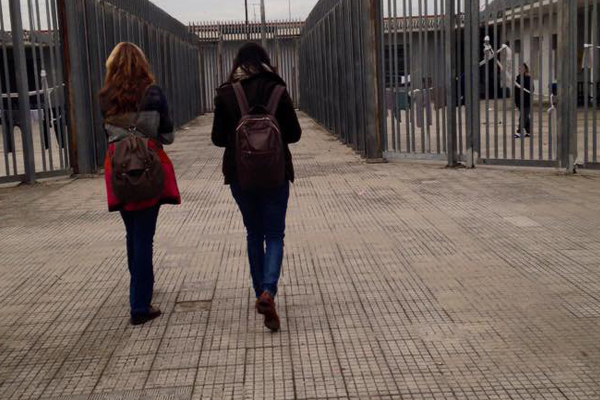“What the European Union is experiencing at the moment is a lack of trust”. A chat with MEP Elly Schlein on the reform of the Dublin Regulation

MEP Elly Schlein during a visit at the Identification and Expulsion Centre “Ponte Galeria” in Rome, Italy.
On May 4th 2016, the European Commission issued a legislative proposal to reform the current Dublin III Regulation, which establishes the mechanism for determining the Member States responsible for assessing asylum applications. The new “Dublin IV” proposal adds some important features to the original legal framework, which have attracted the attention and the critique of many legal experts on migration. Today, the reform is being assessed at the European Parliament and Asylum Corner has interviewed MEP Elly Schlein (S&D) to understand more clearly her position on the Dublin system and the highlights of the new proposal.
Asylum Corner: Let’s start with an overall assessment of the Dublin system as a whole. What is your opinion on it and what do you think could be a sustainable way to replace it?
Elly Schlein: From the start, the Dublin system has been a very hypocritical one, because it was structured in a way that meant most of the burden was to be shouldered by border Member States (MS). You needed only to read the Dublin Convention first and the Regulation later to foresee that it would not have been a sustainable system in the long run. This became fully evident when the Libyan and the Syrian crisis broke out in 2011. Today, we have the opportunity to change this system and create one that is really sustainable, following what is already enshrined in our Treaties. I like to remind my colleagues that we are not asked to invent anything; we are only asked to implement what is written in Art. 78 and 80 of the Treaty on the Functioning of the European Union. Both articles call for assistance based on solidarity and an equal share of responsibility among the MS. This is of course not happening if 6 out of the 28 MS have dealt with 80% of all asylum requests submitted in the EU. So, what now? I am not optimistic about the ongoing debate at the Council and I am very disappointed as a result because, since my election, the Parliament has called for many European solutions based on solidarity among MS (such as the Kyenge-Metsola report). We called for a European centralized system to deal with asylum requests, the overcoming of the criterion of First Country of Entry and a permanent and automatic mechanism of distribution of asylum requests among MS. Therefore, the Parliament is not the problem. The problem lies in the Council, in the selfishness of many European governments who refuse to take their fair share of responsibility. I do not understand how some MS only want to enjoy the benefits of the EU without giving anything back in terms of solidarity.
AC: Talking of solidarity, some people may argue that the provision enclosed in the reform which triggers a relocation mechanism when a MS reaches the 150% threshold in its capacity to process asylum applications is indeed a solidarity element.
ES: I think the threshold proposed by the Commission is abstract and mathematical. It cannot function because it does not take into account the fact that the reception systems of some MS are already on the verge of collapse. So, this provision comes in too late and it is not at all what the Parliament has been asking for. In fact, we are insisting on having a lower threshold or not having a threshold at all. If we have to reform the Dublin system, and this would be for the fourth time now, it is the moment to do it for real, addressing the shortcomings of the present system; this can only be done by establishing a solidarity mechanism that is triggered immediately and not after the crisis has taken place which leads to very poor reception conditions and violation of human rights.
AC: Looking at the current debate on the reform, do you think there could still be room for the asylum seekers’ preferences in choosing a host country?
ES: Allow me to step back for a moment to elaborate my answer better. What the European Union is experiencing at the moment is a lack of trust. A lack of trust among MS, a lack of trust towards the asylum seekers who we should be protecting and towards the system itself. So, the question is: how do we create a system that fosters mutual trust? We should be able to give clear future prospects and build that trust with refugees. But this is not the direction taken by the Commission in its proposal. Reading the reform, one gets the feeling that the text is written to reassure MS rather than to improve the system. The main example is the effort made to prevent secondary movements, as most MS worry about it. While it is clear that the only way to prevent secondary movements is to take into account – as much as possible – the ties and preferences of asylum seekers in choosing a host country. Many experts on migration law also claim that the failure of the Dublin system is due to its coercive nature. Reducing coercion would then mean decreasing the number of secondary movements across the EU. Giving a high priority to family reunification, broadening extensively the concept of “family”, considering the ties and the preferences of asylum seekers, could all be ways of freeing the system from some unnecessary constrictive elements.
AC: But still the reform proposal goes in the opposite direction, making for example some asylum requests “inadmissible”.
ES: The inadmissibility checks proposed by the Commission in Art. 3(3) are one of the most worrying aspects of the whole reform because they are based on a very vague concept of Safe Third Country, which is defined in the Procedure Directive and which foresees a high level of discretion by the MS, who have to decide whether a third country is a safe state or not. Put in the broader context of the EU-Turkey Deal, a potential Italy-Libya Deal and the new Partnership Framework with African Countries, we see a clear tendency of the EU migration and asylum policy to externalise our borders and responsibility. The combination of these agreements with the inadmissibility checks will facilitate the return of asylum seekers to Safe Third Countries, including minors, families and vulnerable people. Moreover, the inadmissibility checks would add another burden to the MS that are located on the “hot” borders of the EU.
So, yes, I am strongly fighting against the inclusion of inadmissibility checks in the reform, and I am also trying to raise awareness among my colleagues about the importance of such provision, because if it goes through, one day we may have a harmonized European asylum system, but one without asylum seekers.
AC: One last question: in a provision – which the ECRE has defined as “counter-intuitive” – the proposal abolishes the so-called “sovereignty clause”, which allows MS to refrain from conducting systematic Dublin procedures, as was the case in Germany with Syrians in September 2015. What is your position on that?
ES: I am of course firmly against this provision believing that, in a system that works not only should asylum seekers be entitled to express their preferences about where to be relocated, but Member States who are willing to do more should be given the chance to do so. There is absolutely no reason to build such a strict mechanism like the one enshrined in the Commission proposal. Once again, this reform seems to be written only to assess clearly who is responsible to process an asylum application rather than to improve the system and make it more efficient and humane.




